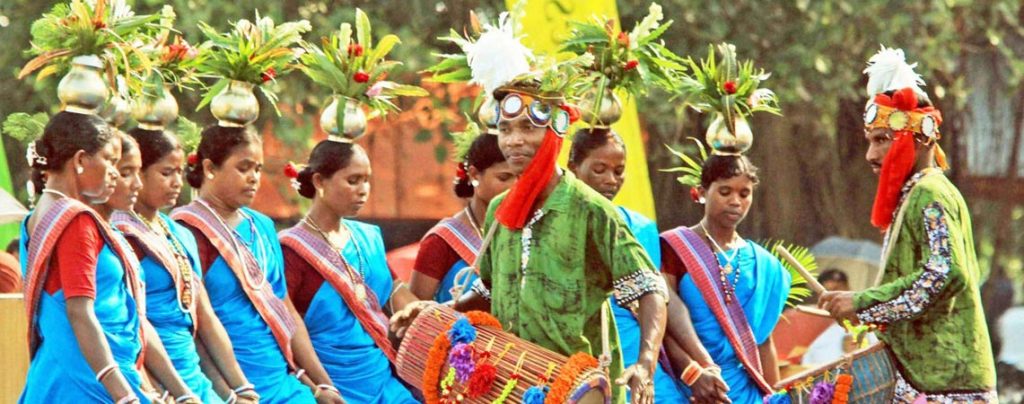Notes from a Diary of my field trip in the Naxal area of the country- Part II
- admin
- September 5, 2019


A travel journal by Mridugunjan Deka
The author pursued History from Hindu College, University of Delhi and a Master’s in Peace and Conflict Studies from TISS, Guwahati. He is presently pursuing MPhil as a Junior Research Fellow (UGC) from the University of Gauhati. He is interested in identity politics, memory studies, nationalism, forced migration issues, among other academic interests. Also an amateur poet, he loves to travel and dream a lot, mostly in what we call the Northeast of India.
“One evening I asked Greta about the red insurgency in her village-Masaliya, a few hours travel from Shikaripara. She proudly declared that ‘they’ are good people, fighting for dispossessed Adivasis, and were misunderstood by the non-tribals as terrorisers.”
Greta is a nineteen years old Santhali girl. She was one of the five mentors I had to supervise in the field. Her family had fallen on hard times. The diminutive girl had to brave her way through a job and education simultaneously. Pranjal had arranged for her to stay in the office itself, till she could find a room of her own in the small hamlet of Barmasia, four kilometres from the rural centre of Shikaripara. My room was right below Pranjal’s, opening into the office room through an ante-chamber. Lankesh, who was another of my mentor staff, stayed a few yards away, and the three of us would gather in the evenings after the day’s work or travels, and talk for an hour at least without fail. We would talk about the day’s happenings, interesting characters encountered in the field. Sometimes, it was exclusively about local food offered by kind villagers, who would simply stretch their hands to the nearest branch overhead and pluck a ripe, fresh fruit. One evening I asked Greta about the red insurgency in her village-Masaliya, a few hours travel from Shikaripara. She proudly declared that ‘they’ are good people, fighting for dispossessed Adivasis, and were misunderstood by the non-tribals as terrorisers. I was a little taken aback at her frank statement, devoid of any kind of self-censure, which is usually the norm now-one simple tweet can land you in jail, or worse NSA and sedition charges might also queue up. It was almost dare-devilry to say that to a complete outsider. Behaving like a typical city-cautious bloke (and to my regret later), I asked her to be a little discreet when talking about ‘it’, for her own safety. She gave a confused nod, and we talked for a few minutes before parting for dinner. Goddammit ! The protocol. I had to accompany the mentors in their travels. It was not a necessity, but the office bored me.
I would take my laptop, carry hurriedly packed tiffin, and be off with them. Greta’s field was at the farthest and the accessibility was dismal. For tens of kilometres the roads would disappear completely, the wheels would have to follow the trail of crumpled grasses, if one did not want to get lost in the great jungles of the land. Villages would jut out of the forests at irregular intervals and not a soul could be seen, sometimes for miles. One such village was Gandrakpur, situated a good thirty kilometres from the office. The locals avoided travelling too far in that place in the day, and travelling there alone at night for an outsider was unthinkable. Greta was apprehensive at being allotted villages in that Cluster, called Asha, and tried to change her field. She failed. Being an Adivasi herself, a quasi-local of sorts, did not particularly help her effort at changing her field. She told us of the stories from Gandrakpur: how dead bodies, often riddled with bullets, were found dumped in the bushes and streams of the terrain. The place was a beautiful one, strewn with wide high-lands, bridges, tall sal trees and of course dates and palms. One could also see small parish churches along the way, and a few crumbling government health centres and primary schools, some of which were totally in ruins and possibly abandoned. Travel as we did, across villages, trying our hands at training women on gender and health, holding meetings, we would only come upon the typical village drunk now and then, and that being the only bodily threat, if the day was bad. Luckily, except the instances involving the former and a few inquisitive or suspicious eyes, I never came across a Naxal rebel. So, I decided to try quenching the curiosity at the monthly meet in Ranchi. There was Mr Rajneesh.
Rajneesh is a burly man, short in stature and high in spirits, blessed with a mouth full of anecdotes drawn from his lived experiences. His bushy, sharp eyebrows would take a life of their own as he would jut in funny stories between team meetings to relieve us of the boredom. Often by doing this, he carried the meetings off to a gala-event of one man show of rhetorical anecdotes. Everybody loved his artful oral exuberance, and it was in the last team meeting I had attended (I didn’t know it at that time) that he gave a few insights into the Jharkhand (then Bihar) of his youth. Rajneesh and us, at freezing temperatures in Kanke (famous for the psychiatric hospital, whose name is taken in vain as many in Assam do the same with Tezpur), sat one morning in the newly constructed building of the organisation, on the terrace, basking in the morning sun. The wind was blowing at a pace, it seemed it would freeze the hair and bring -off the skin…But we were all ears.
“ I had just passed out with a MSW and was working with a rural development organisation”, he began after taking stock of our comforts and discomforts in the office the night before and jokingly taking stock of the quantity of alcohol we had consumed in the same time space. He started the conversation off after a colleague observed the situation of the Adivasis in the capital of the State- an ironical and shameful case of dispossession of land, which he argued is more than ninety percent.
“It was a very interior village in the early nineties”, he continued, “ my task was to create and assist women’s self-help groups. It was a difficult job back then, not any easier now also, but back then this area was a major Naxalite zone. The village was near Chaibasa. We would often encounter rebels in our work. They would be keeping watch from tree-tops, watching their compatriots frisk us. We didn’t dare to look up, they were up there with guns, and we knew that. Curiosity could mean certain death.”
Rajneesh spoke of one instance when he was stopped by a rebel leader, something he particularly remembered because it was a face to face interaction He had a poignant, but confused, sense of empathy, on that meeting. “This man was masked and wouldn’t trust me. He didn’t listen to my pleas that I was a social worker. I was scared. He kept blocking the way and his fellow rebels had surrounded me. In the midst of my desperate persuasions, I said that I was an alumnus of XISS. The atmosphere lightened suddenly. A smile came upon his face; he patted my shoulder and cleared the way. He told me to keep bringing ‘revolution’ in the cities, just as he would keep bringing ‘revolution’ in the villages.
But Rajneesh had known ugly stories too. In fact, these are the stories he had known the most. He talked about the fate of a particular young man who had joined the rebels to take revenge upon a few of his village folks-ostensibly for harassing his family, belonging to a lower-caste. The young man received combat training from the rebels, after formal induction; but deserted them and went back to his village to take his revenge. He failed, and was captured later by the rebels. His former comrade-in-arms had no mercy for him. “He was killed in the most in-human way”, said Rajneesh and paused for a while. He had spoken a few moments earlier about the standard way of torture/killing, the Maoists employed— its’ like drawing a crease from one earlobe to the other, going all the way over the throat. A knife/dagger does the job. We let the sun and the wind lift up the morose and macabre sight, an image so stubbornly taking root in our minds.
Rajneesh wasn’t done yet.
“In some places, however, notwithstanding the torture these Naxalites make innocent village folks go through, their presence had determined important social unrest. In many villages, the oppressed, lower castes and tribals could find a voice, and the strength to rebel at the injustices perpetrated on them. There was this incident where the upper-caste landlord, belonging to royal lineage, would force newlywed brides of the lower castes to sleep with him on the first night of marriage. The villagers were utterly helpless before him. Imagine the kind of anger seething inside them. Once the armed rebels entered the village and news spread of their revolutionary mission, the landlord and his royal palace were burned to the ground.”
View of a house at village Asna from terrace of another
It is late January. I am bed-ridden and recuperating from a surgery at home in Guwahati. Lankesh calls me up, enquires about my health, I enquire about his in return. “Remember, that uncle (Lankesh’s tauji) you met at the mall in Dumka? He was involved in a counter-insurgency operation in Shikaripara. Two Maoists were killed in action.” The spot, I learn later, is two kilometres from Barmasia. Lankesh sends me pictures of the aftermath of the operation on Whatsapp and I scroll over and over. Dare I say, with mixed feelings?.



















